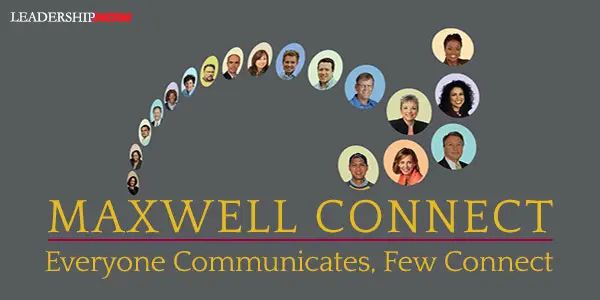 |
 |
06.14.10

Maxwell Connect: Everyone Communicates, Few Connect
GEORGE BERNARD SHAW said, “The greatest problem in communication is the illusion that it has been accomplished.” How true. One of the biggest reasons leaders fail is their inability to communicate. Most of the time, we unconsciously leave it to chance. Just because we say something doesn’t mean we have communicated it. As John Baldoni observed, “The ability to speak is not the same thing as the ability to communicate….The capacity to construct a message, address it to another, listen for feedback, process that feedback, and continue to communicate in ways that are understood is one of the hardest things a leader will have to do.” But it can be done if we are willing to make the conscious choice to connect with others. John Maxwell has written a clear and well-organized book (with his writing partner Charlie Wetzel) about connecting with others one-on-one, in groups, and before an audience. It’s a practical book about bridging the gap between you and the people you are trying to connect with. Everyone Communicates, Few Connect is oriented towards leaders, which is to say, any of us that decide to make a choice to intentionally influence others. Connecting is basic to human relations. Maxwell puts it simply: “If you want to succeed, you must learn how to connect with others.” He asks, “Have you ever heard of someone who is said to have a charmed life? Usually, those are people who have learned how to connect. When you connect with others, you position yourself to make the most of your skills and talents.” How does connecting happen? Not surprisingly, it all begins with your attitude. “The ability to connect with others begins with understanding the value of people.” As with leadership in general, connecting is about other people. In a word, selflessness. It is about asking yourself, “Am I going to make this about them or me?” Maxwell points out that “understanding that your focus must be on others is often the greatest hurdle people face in connecting with others.” It’s all too easy to get caught up in what we are doing to the point where we place it and ourselves at the center of the universe. Maxwell writes, “Good teachers, leaders, and speakers don’t see themselves as experts with passive audiences they need to impress. Nor do they view their interests as most important. Instead, they see themselves as guides and focus on helping others learn.” He tells a story from when he began his career as a minister. He felt frustrated and unfulfilled. He kept asking himself questions like, “Why aren’t people listening to me? Why aren’t people helping me? Why aren’t people following me?” He writes, “Notice my questions centered on me because my focus was on me….I was self-absorbed, and as a result, I failed to connect with people….I realized that I was trying to get ahead by correcting others when I should have been trying to connect with others.” It is all too easy to focus on our needs instead of the needs of others. There are three questions people are always asking about you: “Do you care for me?” “Can you help me?” and “Can I trust you?”Connecting begins when the other person feels valued. We need to have the attitude and approach of “What can I do to increase my value of others?” The ideas he presents are not new nor should we expect them to be. While technology has changed some of our tools of communication, it has not changed the principles of connecting. Ironically, technology has not made it any easier or better. Today's technology won’t communicate a selfless attitude any better than using smoke signals if it is not the foundation of the communication in the first place. Forming connections with each other has not changed over time. We must always be reminded of the principles behind it. 
Posted by Michael McKinney at 11:59 AM
|
BUILD YOUR KNOWLEDGE
 

How to Do Your Start-Up Right STRAIGHT TALK FOR START-UPS 
Grow Your Leadership Skills NEW AND UPCOMING LEADERSHIP BOOKS 
Leadership Minute BITE-SIZE CONCEPTS YOU CAN CHEW ON 
Classic Leadership Books BOOKS TO READ BEFORE YOU LEAD |